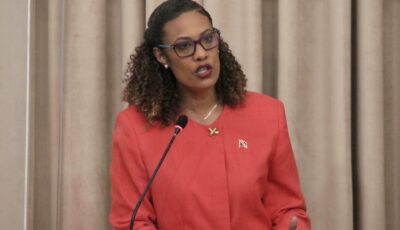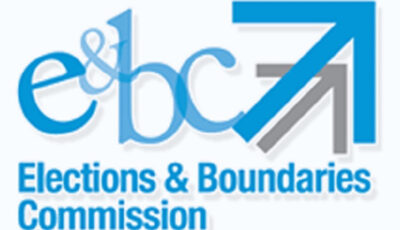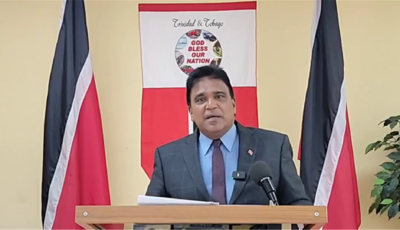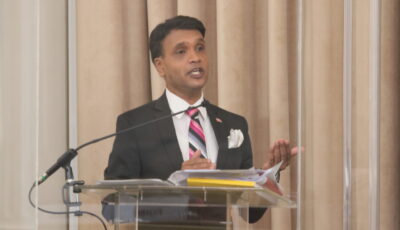Khan on e-mail controversy: Probe Rowley and Gordon over treason
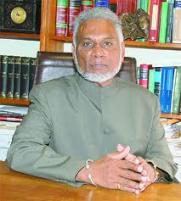 Since new commissioners were appointed on June 16, the Integrity Commission has had three meetings to date, the last one on Monday, its communications head Mervyn Crichlow said yesterday. Asked if the e-mail scandal was now being investigated by the commission, Crichlow said: “I can’t comment on matters that come before the commission.”
Since new commissioners were appointed on June 16, the Integrity Commission has had three meetings to date, the last one on Monday, its communications head Mervyn Crichlow said yesterday. Asked if the e-mail scandal was now being investigated by the commission, Crichlow said: “I can’t comment on matters that come before the commission.”
Commission chairman Ken Gordon could not be reached for comment yesterday. His wife, Marguerite, said he would normally be at the Integrity Commission during the day but the T&T Guardian called there for him several times and was told he had stepped out.
Attorney for Prime Minister Kamla Persad-Bissessar Israel Khan, SC, repeated his charge that if the contents of the controversial 31 e-mails implicating high government officials in misconduct also turned out to be fake, then the police would have to investigate Opposition Leader Dr Keith Rowley and Gordon to see if any treason was committed. Khan, contacted yesterday by the T&T Guardian, said the e-mails were fake was pretty certain and the issue that remained to be cleared up was whether the contents were true.
Khan said if it turned out that if those allegations were a fabrication, the police would have to investigate Rowley and Gordon. He added: “Treason is any deliberate attempt to bring down the constitutionally elected government. “It could be an act too. It does not only have to be through violence. The police will have to investigate whether there was any conspiracy to bring down the Government.
“When Rowley sent the e-mails to the Integrity Commission, there was no board. Gordon will have to give a statement to the police on whether he conspired with Rowley.” Khan drew reference to Gordon’s political background, saying he had not always been only a media mogul.
“Gordon was minister of tourism in the former National Alliance for Reconstruction (NAR) government. The NAR government, led by Arthur NR Robinson, split with the United Labour Front faction, led by Basdeo Panday, in 1988. Gordon is not only a media mogul, he was also a politician,” Khan said. On July 12, Khan wrote Gordon asking him to recuse himself from any probe into the e-mails.
He said there was the risk of “the appearance of insidious political bias” if Gordon presided over the probe because of the “secret” meeting he held with Rowley at his home. Khan’s letter was copied to the commission’s new deputy chairman, retired Justice Sebastian Ventour, and the new commissioners — ophthalmologist Dr Shelly Ann Lalchan and engineer Deonarine Jaggernauth and Sieunarine Jokhoo, who served on the last commission and was reappointed.
Asked if Gordon had replied to his letter, Khan said: “I never got a response but I have given him an ultimatum to respond by Monday coming.”
The e-mail scandal
Among the issues discussed in the e-mails was a plan to tap the phone of the Director of Public Prosecutions and intimidate the T&T Guardian journalist who wrote the story about the early proclamation of Section 34 of the Administration of Justice (Indictable Proceedings) Act 2011. The Section 34 legislation would have allowed for the dismissal of certain court matters if they were not heard ten years after the alleged offence.
UNC financiers Ishwar Galbaransingh and Steve Ferguson would have been among those freed but the legislation was repealed two weeks after its proclamation. The e-mails appeared to have come from addresses belonging to the Prime Minister, Attorney General Anand Ramlogan, Housing Minister Dr Roodal Moonilal, Local Government Minister Dr Suruj Rambachan and the PM’s security adviser Gary Griffith.
Acting Commissioner of Police Stephen Williams has said the 31 e-mails Rowley disclosed in Parliament in May were fake. Rowley made the disclosures shortly after he had a private “secret” meeting with Gordon at his home. After the e-mails were revealed, the PM called on the police to investigate the matter but Rowley has maintained that the Integrity Commission, and not the police, was the body to investigate them.
Rambachan recently said Google International confirmed the e-mails were fake. Rowley, dismissing the claims, responded only by renewing his calls for the Integrity Commission to investigate them.






